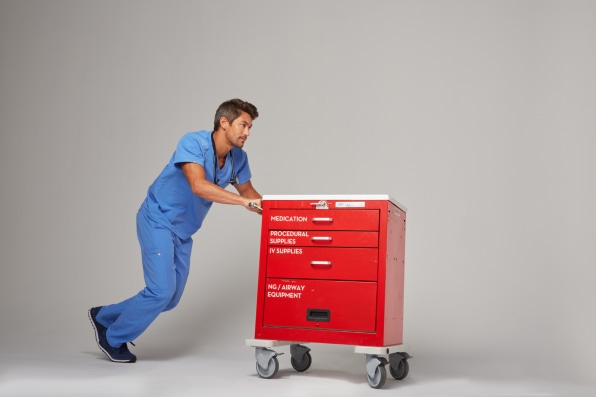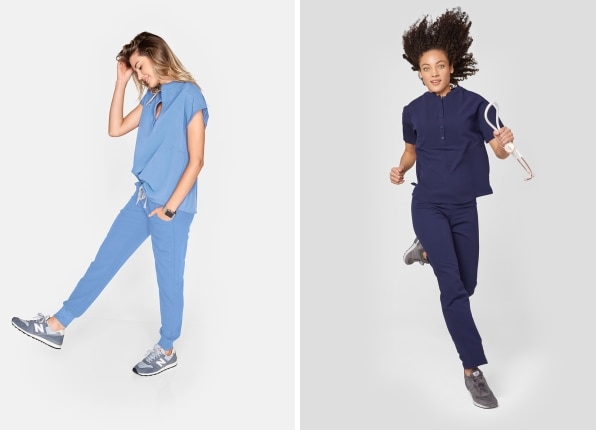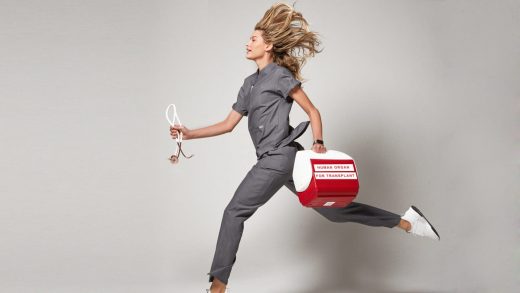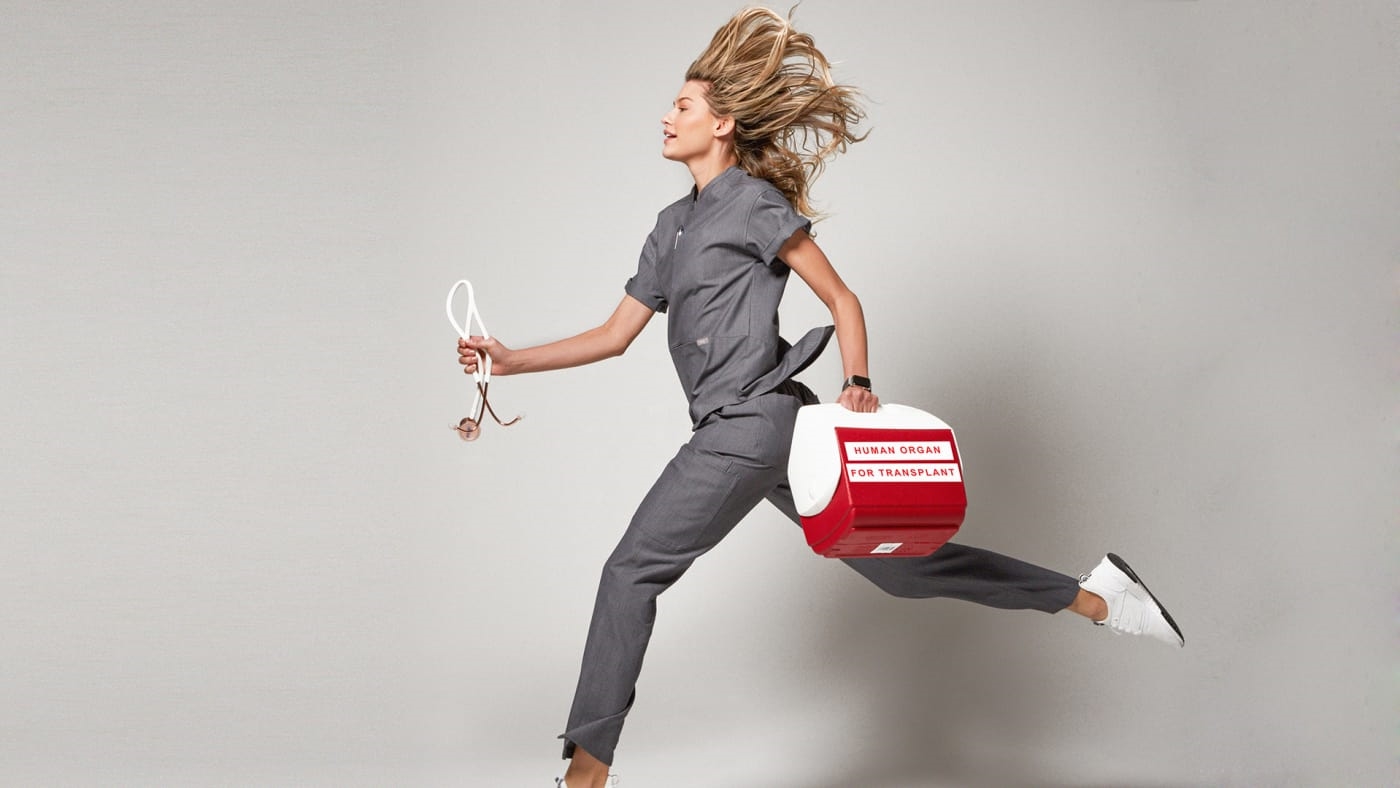Female founders give scrubs a functional, fashionable makeover
Former med student Heather Hasson was out to coffee with her nurse practitioner friend when she first cast a wary eye on what she wore—big, boxy medical scrubs with a label on the back that boldly announced her size. The ensemble, constructed of dull, rough cotton, hung lifelessly on her curves, and was unflattering to the point of distraction.
“I’m looking at her thinking: ‘You make a decent amount of money. Why are you wearing these?’” recalls Hasson. She thought of all the brands reimagining functional athletic attire, like Lululemon and Nike, and wondered why medical wear was still in the dark ages.

The pair ventured to a medical supply store where the scrubs were sold—a small fluorescent-lit shop filled with wheelchairs, canes, and essentially one brand of scrubs. “It was the most terrible experience,” says Hasson.
Talented with a needle and thread, Hasson had her friend hand over her scrubs and got to work adding inseams at the shoulder, a fitted waist, and elastic to hold up the pants instead of a drawstring. At the hospital (Cedars-Sinai Medical Center in Los Angeles) where the pal worked, colleagues took notice and liked what they saw.

Elevating the product
Soon they started ringing Hasson up, asking: “Hey scrubs girl, can you do the same thing for me?” That moment, six years ago, was when Hasson realized she was on to something.
A year later, she and friend Trina Spear cofounded FIGS, a direct-to-consumer line of fashionable, functional medical garb for men and women. The goal? Revolutionize an industry worth $10 billion stateside, and $50 billion worldwide. One in 10 people in the U.S. wears scrubs.
The duo started small: They packed a car with their creations at medical centers during shift changes. They didn’t have great expectations for selling clothing out of a trunk, but within weeks, doctors, nurses, and assistants were lining up.
“We were elevating the product–making clothes that can help the healthcare professional do their job better,” says Hasson.

Building “something better”
The scrubs industry is dominated by a few massive companies that, FIGS cofounder and co-CEO Trina Spear maintains, produce the lowest-cost product, made in Asia, without much thought to the customer experience (i.e., stiff cotton and billowy silhouettes).
The women decided they would build FIGS from the ground up, creating a vertical supply chain that gave them control of everything from the yarns to the fabrication. They brought together fashion designers and medical professionals to design for their target audience. For example, the line comes in wrinkle-free, antimicrobial fabrics that reduce and inhibit bacterial infection. Tops and bottoms feature double the number of zippered pockets, with easy-to-access space for tools like stethoscopes, scissors, smartphones, and IDs. Pants come with four-way stretch.
“We design around them,” stresses Hasson.
Prior to FIGS, women would find themselves pinning their wedding rings to their bra strap for lack of pockets. And then were the droopy pants with drawstring waistbands.
“How can you be focused on saving lives, curing diseases, and caring for patients when your pants are falling down?” says Spear. “This isn’t rocket science, but there has to be something better to help you do your job well.”
As both the manufacturer and seller, FIGS can garner feedback on designs and react. That means, for example, changing pockets to fit a different-sized iPhone.
A major appeal of the brand is also its updates to the bland style of scrubs to look a bit more polished at work. The core collection comes in slimmer, sleeker cuts and tailored side seams or pleated backs. It also produces limited-edition collections borrowed from popular trends, including Mandarin collars, trouser bottoms or jogger-style pants. One woman’s top has a pin-tuck bib that looks more Ann Taylor LOFT than anything you’d spot in a nurse’s lounge.
“You see totally new styles that you would never think of as scrubs,” says Spear.
Much like how kitchen or fast food uniforms now see designer oversight, FIGS is showing that fashion is no longer reserved just for fashionistas.
“All of these large [scrubs] companies are just so focused on making money, on how to extract pennies,” says Spear. “If you do that, you’re not trying to create something cool. You don’t have a mission. You’re not standing for something. You’re not empowering people . . . We wanted to bring this industry up to date.”

From head to toe
Although still largely affordable, FIGS scrubs run about 20% above average. A pair of pants, on average, cost $42, while tops go for $38-$44. That isn’t much for what some consider a premium product, but for medical assistants or individuals who make less than a physician, that could present a stumbling block. In general, customers need multiple pairs of scrubs for their workweek.
So far, FIGS has mostly been applauded by the medical, dental, and veterinarian industry. From 2014-2017, the startup grew over 10 times in revenue. In the last year alone, it grew 600%, and according to its estimates, 90% of American healthcare professionals now own at least one pair of FIGS. It foresees generating north of $100 million in revenue in 2018.
In January, FIGS raised $65 million in its most recent investment round, bringing total funding to $75 million. Its success has led to competition from other brands, like Jaanuu, which also offers a contemporary spin on medical apparel.
Spear says her company has plans to keep growing, with the introduction of new categories, like jackets, hats, and accessories such as compression socks. “We are going to outfit the healthcare professional from head to toe,” she vows.
For the FIGS team, it’s all about making the medical uniform a symbol of pride and comfort. It’s the very least, says Hasson, that she can do for those whose sole mission is to care for others. And perhaps, in turn, it will make its way back to society.
“Just because you’re a nurse or a doctor doesn’t mean you don’t want to look good in the morning,” says Hasson. “If you put on something that you absolutely love, and feel good in, you are going to crush it that day . . . You’ll be happier and treat people better because that’s the nature of what fashion does.”
Fast Company , Read Full Story
(48)



